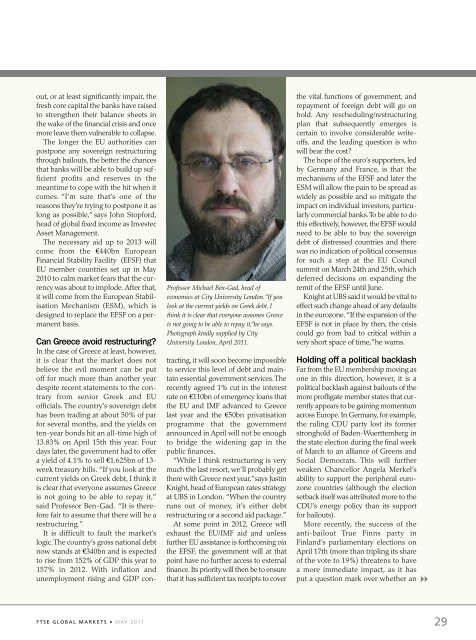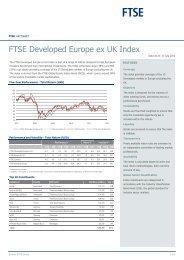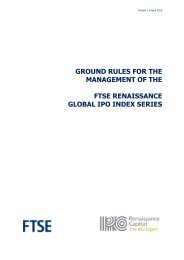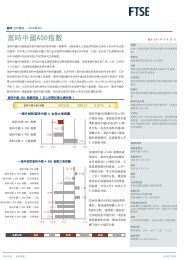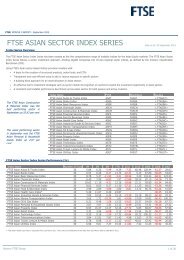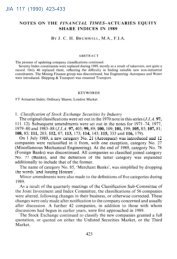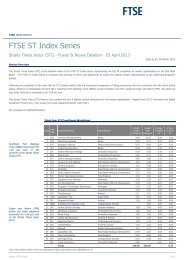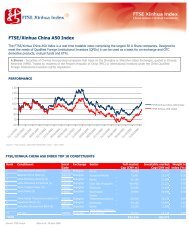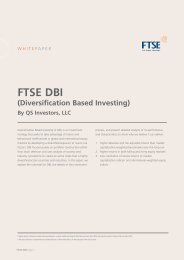The Importance Of Being Earnest - FTSE
The Importance Of Being Earnest - FTSE
The Importance Of Being Earnest - FTSE
You also want an ePaper? Increase the reach of your titles
YUMPU automatically turns print PDFs into web optimized ePapers that Google loves.
out, or at least significantly impair, the<br />
fresh core capital the banks have raised<br />
to strengthen their balance sheets in<br />
the wake of the financial crisis and once<br />
more leave them vulnerable to collapse.<br />
<strong>The</strong> longer the EU authorities can<br />
postpone any sovereign restructuring<br />
through bailouts, the better the chances<br />
that banks will be able to build up sufficient<br />
profits and reserves in the<br />
meantime to cope with the hit when it<br />
comes. “I’m sure that’s one of the<br />
reasons they’re trying to postpone it as<br />
long as possible,” says John Stopford,<br />
head of global fixed income as Investec<br />
Asset Management.<br />
<strong>The</strong> necessary aid up to 2013 will<br />
come from the €440bn European<br />
Financial Stability Facility (EFSF) that<br />
EU member countries set up in May<br />
2010 to calm market fears that the currency<br />
was about to implode. After that,<br />
it will come from the European Stabilisation<br />
Mechanism (ESM), which is<br />
designed to replace the EFSF on a permanent<br />
basis.<br />
Can Greece avoid restructuring?<br />
In the case of Greece at least, however,<br />
it is clear that the market does not<br />
believe the evil moment can be put<br />
off for much more than another year<br />
despite recent statements to the contrary<br />
from senior Greek and EU<br />
officials. <strong>The</strong> country’s sovereign debt<br />
has been trading at about 50% of par<br />
for several months, and the yields on<br />
ten-year bonds hit an all-time high of<br />
13.83% on April 15th this year. Four<br />
days later, the government had to offer<br />
a yield of 4.1% to sell €1.625bn of 13week<br />
treasury bills. “If you look at the<br />
current yields on Greek debt, I think it<br />
is clear that everyone assumes Greece<br />
is not going to be able to repay it,”<br />
said Professor Ben-Gad. “It is therefore<br />
fair to assume that there will be a<br />
restructuring.”<br />
It is difficult to fault the market’s<br />
logic. <strong>The</strong> country’s gross national debt<br />
now stands at €340bn and is expected<br />
to rise from 152% of GDP this year to<br />
157% in 2012. With inflation and<br />
unemployment rising and GDP con-<br />
F T S E G L O B A L M A R K E T S • M AY 2 0 1 1<br />
Professor Michael Ben-Gad, head of<br />
economics at City University London. “If you<br />
look at the current yields on Greek debt, I<br />
think it is clear that everyone assumes Greece<br />
is not going to be able to repay it,”he says.<br />
Photograph kindly supplied by City<br />
University London, April 2011.<br />
tracting, it will soon become impossible<br />
to service this level of debt and maintain<br />
essential government services. <strong>The</strong><br />
recently agreed 1% cut in the interest<br />
rate on €110bn of emergency loans that<br />
the EU and IMF advanced to Greece<br />
last year and the €50bn privatisation<br />
programme that the government<br />
announced in April will not be enough<br />
to bridge the widening gap in the<br />
public finances.<br />
“While I think restructuring is very<br />
much the last resort, we’ll probably get<br />
there with Greece next year,” says Justin<br />
Knight, head of European rates strategy<br />
at UBS in London. “When the country<br />
runs out of money, it’s either debt<br />
restructuring or a second aid package.”<br />
At some point in 2012, Greece will<br />
exhaust the EU/IMF aid and unless<br />
further EU assistance is forthcoming via<br />
the EFSF, the government will at that<br />
point have no further access to external<br />
finance. Its priority will then be to ensure<br />
that it has sufficient tax receipts to cover<br />
the vital functions of government, and<br />
repayment of foreign debt will go on<br />
hold. Any rescheduling/restructuring<br />
plan that subsequently emerges is<br />
certain to involve considerable writeoffs,<br />
and the leading question is who<br />
will bear the cost?<br />
<strong>The</strong> hope of the euro’s supporters, led<br />
by Germany and France, is that the<br />
mechanisms of the EFSF and later the<br />
ESM will allow the pain to be spread as<br />
widely as possible and so mitigate the<br />
impact on individual investors, particularly<br />
commercial banks. To be able to do<br />
this effectively, however, the EFSF would<br />
need to be able to buy the sovereign<br />
debt of distressed countries and there<br />
was no indication of political consensus<br />
for such a step at the EU Council<br />
summit on March 24th and 25th, which<br />
deferred decisions on expanding the<br />
remit of the EFSF until June.<br />
Knight at UBS said it would be vital to<br />
effect such change ahead of any defaults<br />
in the eurozone. “If the expansion of the<br />
EFSF is not in place by then, the crisis<br />
could go from bad to critical within a<br />
very short space of time,” he warns.<br />
Holding off a political backlash<br />
Far from the EU membership moving as<br />
one in this direction, however, it is a<br />
political backlash against bailouts of the<br />
more profligate member states that currently<br />
appears to be gaining momentum<br />
across Europe. In Germany, for example,<br />
the ruling CDU party lost its former<br />
stronghold of Baden-Wuerttemberg in<br />
the state election during the final week<br />
of March to an alliance of Greens and<br />
Social Democrats. This will further<br />
weaken Chancellor Angela Merkel’s<br />
ability to support the peripheral eurozone<br />
countries (although the election<br />
setback itself was attributed more to the<br />
CDU’s energy policy than its support<br />
for bailouts).<br />
More recently, the success of the<br />
anti-bailout True Finns party in<br />
Finland’s parliamentary elections on<br />
April 17th (more than tripling its share<br />
of the vote to 19%) threatens to have<br />
a more immediate impact, as it has<br />
put a question mark over whether an<br />
29


